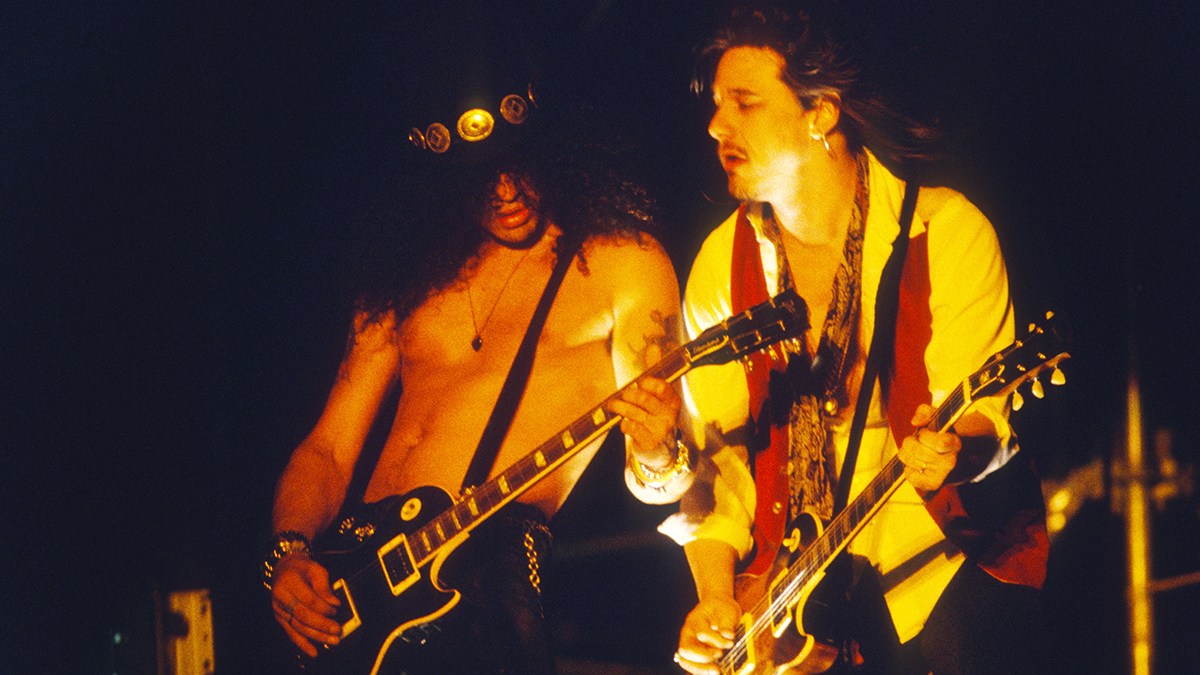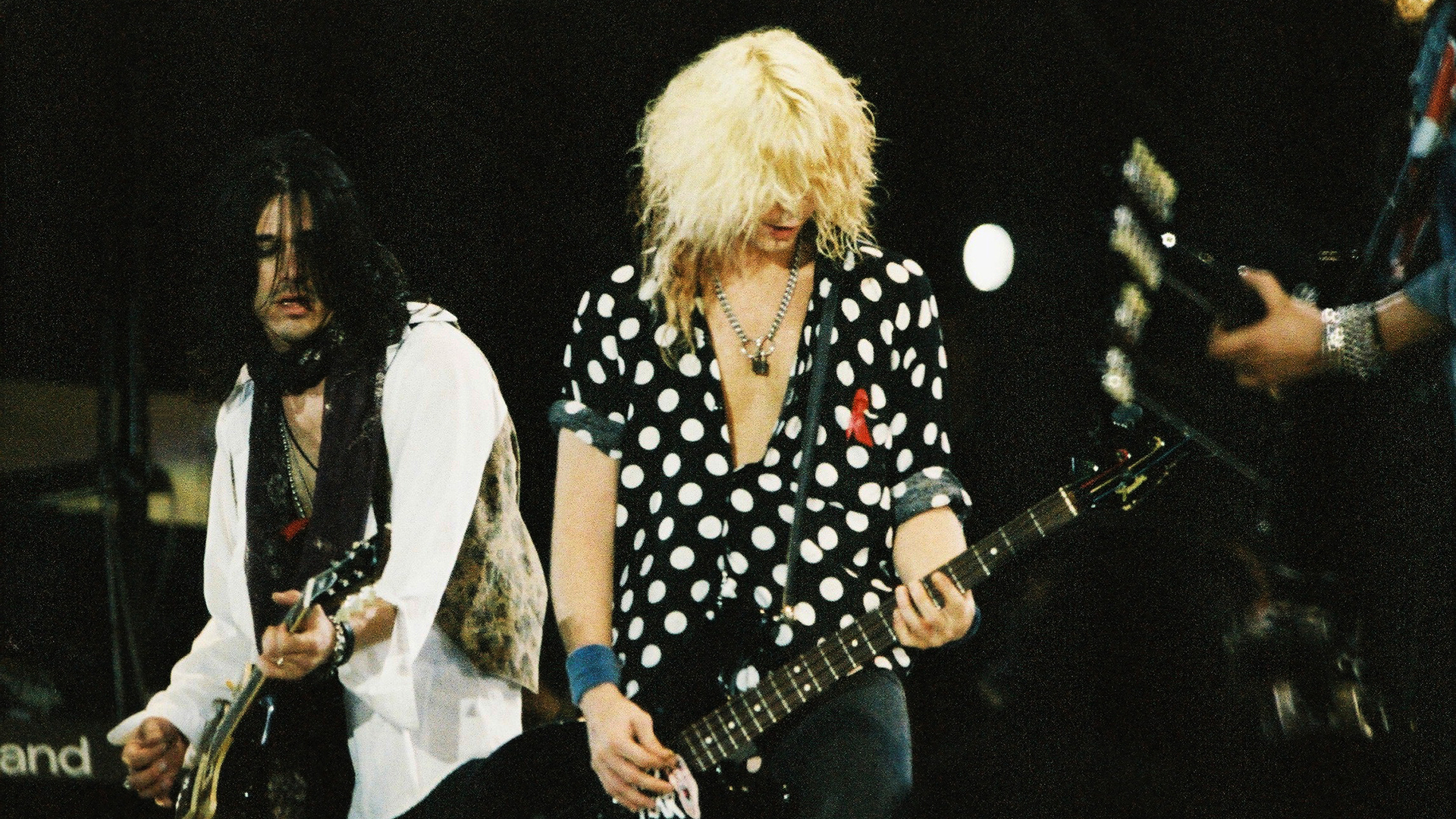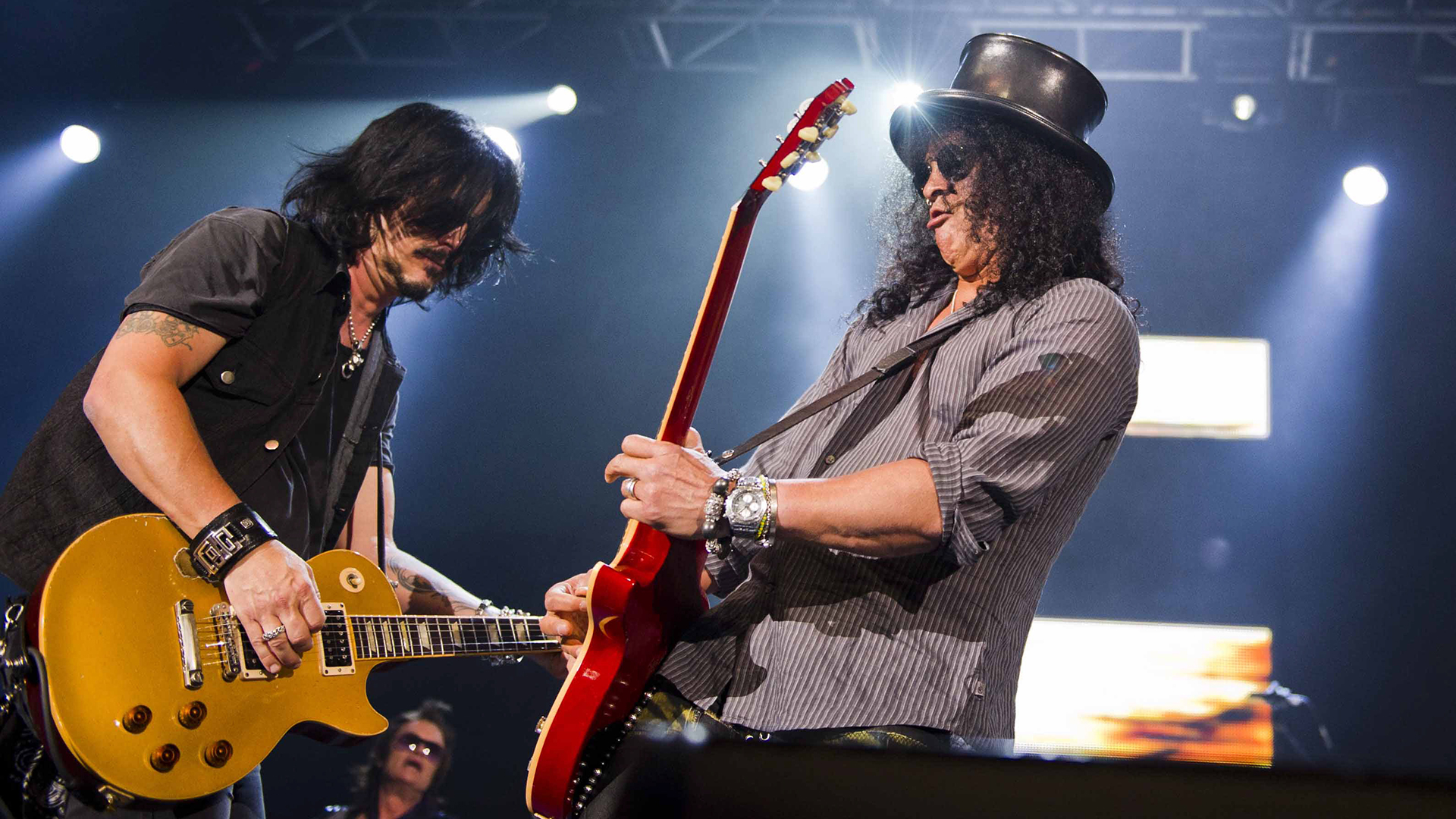
Gilby Clarke’s versatility is not a trick of the light. His influences include The Clash and Mick Ronson, while his resume lists time with Guns N’ Roses, Slash and Nancy Sinatra.
Whether rocking stadiums as GN’R rhythm guitarist at the height of their fame or providing tasteful leads in the studio, Clarke’s mindset remains the same: “I just consider myself a guitar player,” he tells Guitar World. “I don’t consider myself a rhythm or lead player.”
He continues: “Most people know me from Guns N’ Roses, where I was a rhythm guitar player, but before Guns, I was the only guitar player – and since Guns, I’ve been the only guitar player.”
Many will have first encountered Clarke as the man who postured beside Slash during GN’R’s wild Use Your Illusion tour from ‘91 to ‘93, over nine legs and 194 shows. Supposedly, 209 shows were canceled – indicative of the madness inherent in Guns’ world then.
Most people know me from Guns N’ Roses, where I was a rhythm guitar player, but before Guns, I was the only guitar player – and since Guns, I’ve been the only guitar player
Clarke’s era ended with a solo 1994 record, Pawnshop Guitars, and assisting with the 1995 Slash’s Snakepit record, It’s 5 O’Clock Somewhere – born after Axl Rose rejected the pair’s songs.
Clarke is diplomatic. “It was totally Axl’s prerogative,” he says. “To me, we had some good songs, and those records are great. But imagine what me, Slash, Matt, Duff, and Axl could have done with some of that stuff.”
He isn’t crying over spilled milk; he’s rattled off six solo outings since, with 2021’s The Gospel Truth considered his best.
“It always starts with the guitar,” he explains. “Rock music has taken a lot of abuse lately – but I go to shows, and people are still screaming. To me, that says rock is doing pretty good.”
Clarke adds: “I've never considered myself a solo artist; that happened accidentally. But I love the process, and The Gospel Truth was great. I’ve fine-tuned what I do and got the formula down. I’m looking forward to what comes next.”
What was your aim as a young musician?
“What inspired me to play guitar was odd. It was a visual and not a musical inspiration. I was growing up in Cleveland, Ohio, and one day I went into a head shop and saw a poster of Jimi Hendrix at the Monterey Pop Festival. He’s wearing a blue outfit with his white Strat and I was like, ‘That’s the coolest-looking dude I’ve ever seen. I want to do what he does!’ That was my moment.
“From there I listened to Kiss, Led Zeppelin, Aerosmith, Alice Cooper and whatever else was popular then. I started a little three-piece band, then I got a British girlfriend, and she switched gears for me – she turned me onto The Clash, Mick Ronson with David Bowie, and T. Rex. That’s when my melodic style took shape. I was never into shredding; I always liked the guys who were there for the song. That’s dictated what I’ve done my entire life.”
Your first proper band was Candy, which was more pop-leaning.
“Oddly enough, Candy happened under similar circumstances that Guns N’ Roses did later. Candy was a band that was playing around and was doing well. A lot of guitar music around Hollywood in the ‘80s was not my cup of tea – I liked the bands, but it wasn’t the kind of music I wanted to do.
“Everyone had the Randy Rhoads and Eddie Van Halen thing happening, but I wanted to be like Rick Derringer and Mick Ronson. So I answered an ad in The Recycler: ‘Guitarist wanted who is into Bowie and T. Rex.’ I was like, ‘Man… I’m there!’”
You had a hand in writing Candy’s minor hit, Dance America. What gear did you use?
“I’ve used the same gear the whole time – there’s been no change. I play the same type of guitar and use the same kind of amp now that I did with Candy: a Gibson Les Paul plugged into a Marshall 50W.”
What attracted you to that combination?
“I’ve looked at it like, what I do is just rock ’n’ roll and should be treated as such. I know there are certain guys, like Joe Satriani or Steve Vai, who have their distinct thing. I want a rig that’s versatile enough to let me be myself but can handle anything, be it Candy or Guns N’ Roses.”
Someone said, ‘Izzy is quitting Guns, and they’re getting Ronnie Wood.’ And I was like, ‘Yeah, no. Ronnie Wood is in the Stones’
How did the Guns N’ Roses thing come up?
“With Guns, a lot was going on there at the time. They’d already made changes with Steven Adler and brought Matt Sorum into the band. And they’d added Dizzy Reed on keys too.
“Interestingly, I wasn’t listening to Guns much then, and aside from Izzy Stradlin, I didn’t know the guys. Izzy and I knew each other and had many of the same influences, and we got along, but I didn’t know Axl or Slash.
“One day, I heard rumors from someone who said, ‘Izzy is quitting Guns, and they’re getting Ronnie Wood.’ And I was like, ‘Yeah, no. Ronnie Wood is in the Stones.’
“But to my surprise, Slash called me, saying, ‘Hey, man, we're looking for a guitar player. I don’t know if it’s temporary or permanent.’ And then he goes, ‘We’ve got a bunch of shows, and we can’t cancel them.’”
Slash wasn’t like, ‘Do it this way or stand here;’ they let me be me
What was the audition like?
“I was working a night gig doing sound around town at small clubs, and I had zero time, but Slash wanted me to come down the next day. So, I had no time to learn the songs and was literally in my car listening to them on the way to the audition. Luckily, they chose three easy ones and had me return the next day.
“I heard nothing after that, and then a friend said he got a call from Slash to come down, so I thought, ‘Okay, I guess I’m not getting the gig.’ But three or four days later, Slash calls and says, ‘You got the gig. We leave next week. Learn the whole catalog.’

“I was like, ‘What? The whole fucking catalog? Don’t you have a set of 20 or 25 songs?’ Slash goes, ‘There’s no setlist. Axl just calls ‘em out, so you gotta know the whole catalog.’
“So, I had one week to learn 50 fucking songs; I was glued to my cassette player. I walked out on stage for my first show with no cheat sheets and having learned all these new songs in one fucking week.”
Guns N’ Roses was chaos by that point. That must have been a shock to the system.
“I’d played arenas, though never stadiums, so that wasn’t too far-fetched. But I know what you mean – the whole Guns machine surrounding them is crazy. But oddly enough, I was already in with the guys; they were beyond cool with me.
“I’d been around; it’s not like I was Joe Schmo coming into the band. They were respectful, and Slash wasn’t like, ‘Do it this way or stand here;’ they let me be me.”
What advice did Slash give to you?
“There were important parts to the songs, but Slash said, ‘Put your stamp on the songs. I want you to play the songs how you'd play them and make them yours.’ That was great advice because it took a lot of the pressure off trying to be Izzy.
Slash called and said, ‘Axl wants nothing to do with the early stuff, and he doesn’t want you in the band anymore’
“I was anxious and wanted to play the songs right. I wasn’t paying attention to the girls backstage, the drugs, and the drinking; I had to remember these 50 fucking songs and not mess up on stage.
“If you’ve ever seen Slash give that look to whoever when they hit a bad note… You get that look once, man. You don't want it twice. Slash and Duff told me to lay back, and I live by that advice to this day.”
You got on well with the guys in Guns – so what led to your solo record, Pawnshop Guitars?
“We were on tour for two and a half years, and it was silently implied that we’d take a break. Going in, I was already a signed writer for Virgin Music and had a ton of new songs, which I presented to Axl and Slash for Guns’ next record. But they wanted to start fresh; so I said, ‘Hey, I want to use these songs; I’m gonna make a record,’ which they were cool with.”
Axl and the other guys guested on Pawnshop Guitars – but the wheels came off shortly after.
“Slash was there; I couldn’t get him out of the studio! We had a strip club across the street, and it was a great excuse to hang out and make music for a few months. But as I was wrapping up the record, Slash called and said, ‘Hey, Axl has changed gears. He wants to go in a different direction, wants nothing to do with the early stuff, and he doesn’t want you in the band anymore.’
“I was like, ‘Okay… what did I do?’ A week later, Slash calls back, saying, ‘Forget all that. Everything’s fine. Don’t worry. I chatted with Axl; we’re back, and we’re good.’
“But after that my checks stopped coming in. I was like, ‘Oh, okay. Guess I am out of the band.’ So I was never fired from Guns – my checks just stopped coming, and it was very odd. I don’t know… Axl just wanted to go in a different direction, and that was it.”
Slash, Duff, Matt, and I were set to play at a birthday party, and just as we were going on, Slash and Duff pulled out
What led to the Slash’s Snakepit record, It’s 5 O’Clock Somewhere?
“Slash went through the same thing as me – he had all these songs, but Axl wanted to go in a different direction. Like me, Slash wrote all these songs and Axl didn’t like them, so that’s how the Snakepit thing happened.
“The truth is, between my songs and Slash’s, we could have had the next Guns N’ Roses record… if we’d just put a little bit of time into it.”

Did Axl, Slash, and Duff call you when they reunited in 2016?
“When they initially reunited, they did not call me. The day before that went public, Slash, Duff, Matt, and I were set to play at a birthday party, and just as we were going on, Slash and Duff pulled out, and they never said a word to me.
After Matt and I played, he said, ‘I think something is up.’ I was like, ‘Yeah? Really?’ But they never asked me. It was always Duff and Slash joining Axl’s existing band. But later, they did call me and ask if I’d be up to do guest spots, which didn’t work out.”
Many people are surprised you and Matt weren’t asked, considering your era is widely considered Guns’ second classic lineup.
“I get that. We can all speculate, but only three guys know the answer. When I see them, it’s the last thing we will discuss. But look, I can speculate – and honestly, I get it. I know what’s going on without anything being said.
“I agree, though; everybody agrees. And when the Rock and Roll Hall of Fame happened, and the five original guys are alive, it’s like, ‘They should be playing together.’ But if you can’t get those guys together… I don’t know.
“I know that Matt and I would love to do it, and I agree with most people. But I understand what went down and is still happening.”
- Keep an eye on Gilby Clarke's site for information on his latest tour dates.







